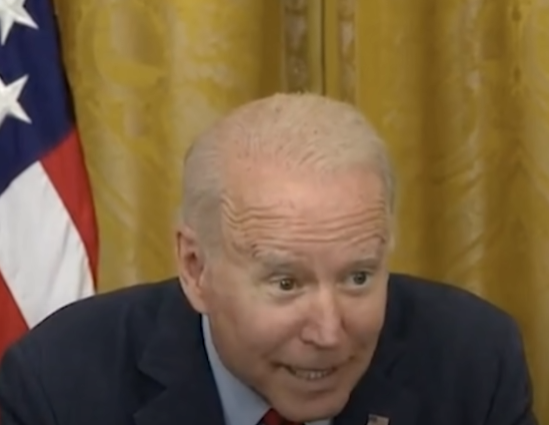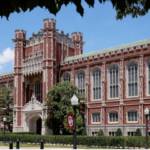The ‘Social Justice Factory’ and Biden’s Title IX Regulations

In June, the Biden administration’s Department of Education rolled out new Title IX guidelines related to how schools must address sexual discrimination and widening the areas of personal interaction and who would be protected under the new rules.
The new language goes beyond sexual interaction and harassment germane to existing Title IX statutes and has broadened the types of incidents and various individuals who would now be protected.
In fact, the 701-page Biden Title IX regulations “Clarify the Department’s view of the scope of Title IX’s prohibition on sex discrimination, including related to a hostile environment under the recipient’s education program or activity, as well as discrimination on the basis of sex stereotypes, sex characteristics, pregnancy or related conditions, sexual orientation, and gender identity [emphasis added].”
The real question is not whether or not individuals who identify as belonging to the opposite gender from which they were born are correct in identifying as such. That is certainly their right. The problem for universities—and the students and faculty who are part of those communities—is whether one person’s gender dysphoria, sexual preference, or attitudes about gender and sexuality in general can, or should, compel others to not only agree with a biologically impossible reality, but to treat the transgender person with special deference or be punished for not admitting belief in something that is counterfactual, against religious beliefs, or transparently false.
Just as the 2011 Obama-era Title IX “Dear Colleague” letter stacked the deck against male students who were reflexively thought to be guilty sexual victimizers of passive and innocent women, the new Biden Title IX guidelines seem destined to make victims out of more students and faculty who push back or ignore the prevailing sexual orthodoxy on campuses—to their potential legal and professional detriment. Observers have already warned that the new Biden regulations will result in what has not undeservedly been called a “Title IX Inquisition.”
No one is suggesting that people cannot identify as another gender at will; but they cannot and should not expect everyone else to recognize their mental and physical transformation and force—by law—everyone to willfully participate in this gender fantasy or be censured.
Consider, for example, the instructive case of a Shawnee State University philosophy professor, Nicholas Meriwether, who was recently awarded $400,000 on appeal in a First Amendment lawsuit against the school. In 2018, a male transgender student filed several complaints against the professor because Meriwether initially called the student “Mr.” before he knew the student was transgender and then only agreed to call the student by his last name and not the preferred pronoun, an accommodation which the school rejected but which Meriwether contended was his constitutionally protected right.
After Meriwether was disciplined and a negative report was placed in his records by the school, the professor sued, claiming, rightfully, that Shawnee State’s non-discrimination policy was unconstitutionally violative of his First Amendment rights and the school, in punishing him reputationally and professionally, had illegally retaliated against him for what is protected speech.
In his appeals case, Meriwether v. Hartop, et al., the court found that although Shawnee’s policies state that “a hostile environment exists only when ‘there is harassing conduct that limits, interferes with or denies educational benefits or opportunities, from both a subjective (the complainant’s) and an objective (reasonable person’s) viewpoint,’ the school’s “Title IX report,” the court noted, “does not explain why declining to use a student’s preferred pronouns constitutes harassment. It does not explain how Meriwether’s conduct interfered with or denied Doe or Doe’s classmates any ‘educational benefits or opportunities,’ let alone how an ‘objective observer’ could reach such a conclusion.”
Shawnee had not even attempted to prove that any harassment was experienced by the Plaintiff or any other students, transgender or otherwise, or that a “hostile environment” was or could have said to have been created as a result of Meriwether’s speech. Nevertheless, in the thrall of woke identity politics, which seems to compel universities to bend over backward to protect the oft-offended victim groups of their respective campuses, cases like this expose the looming pitfalls inherent in vague and censorious Title IX regulations that have now been expanded to include gender and sexual orientation aspects.
Another egregious example of Title IX enforcement run amuck was experienced by Northwestern University gender professor, Laura Kipnis, for a 2015 article she wrote in which she suggested, ironically, that there were too many Title IX investigations. As a result of her piece, she became the subject of a Title IX investigation. When, two years later, she wrote a book on her oppressive experiences at the hands of Northwestern’s Title IX bureaucracy, “Unwanted Advances: Sexual Paranoia Comes to Campus, the university launched a second investigation of her, based on complaints from four Northwestern faculty members and six graduate students apparently offended by the very thought that someone would question the fairness and purpose of policies to control the sexual behavior of adults, even in consensual relationships.
“There is simply no conceivable way in which an essay discussing publicly available (and indeed, widely discussed) information could constitute a violation of Title IX,” wrote the Foundation for Individual Rights and Expression (FIRE) in a 2015 comment about the Kipnis case. “The transmogrification of Title IX into an all-purpose excuse for knee-jerk overreactions to complaints about speech—sometimes only tangentially related to sex—is an unacceptable trend that endangers freedom of expression and undermines the purpose of higher education. That merely discussing issues related to sex or publicly available information could justify a two and a half month investigation in any administrator’s mind shows the extent to which the language and purpose of Title IX has been corrupted.”
In his publicly published resignation letter, Portland State University philosophy professor Peter Boghossian, another professor who became the target of a Title IX investigation as a result of a student complaint, warned that “[w]ith Title IX investigations there is no due process, so I didn’t have access to the particular accusations, the ability to confront my accuser, and I had no opportunity to defend myself.”
Why was this happening at his institution, mirroring what other victims of Title IX investigations have experienced? According to Boghossian, obsessive “wokeness” on campuses is responsible for creating a climate where dissenters who challenge current heterodoxies are censured, punished, and purged. “. . . [B]rick by brick,” he wrote in his letter, “the university has made this kind of intellectual exploration impossible. It has transformed a bastion of free inquiry into a Social Justice factory whose only inputs were race, gender, and victimhood and whose only outputs were grievance and division.”
The original purpose of the 1972 Title IX regulations, of course, was well-meaning in that it was designed to allow both sexes equal access to facilities and sports teams, and stated that “No person in the United States shall, on the basis of sex, be excluded from participation in, be denied the benefits of, or be subjected to discrimination under any education program or activity receiving Federal financial assistance,” including almost all institutions of higher education.
Title IX enforcement and reach expanded substantially with the Obama administration’s “Dear Colleague” letter, putting universities on notice that they had to be particularly vigilant in targeting any instances of what might be perceived as gender discrimination, and cases where sexual harassment or misconduct was alleged, thereby drawing Title IX administrators into the bedrooms and private lives of students and faculty.
But the “Dear Colleague” letter did for sex and gender what diversity, inclusion, and equity bureaucrats did for the DEI obsession on today’s campuses, creating a hammer where everything looks like a nail. In other words, zealous Title IX enforcement became so broad and over-reaching as to become absurd and unfair, so that, as some Title IX policies demanded, students could be found to be creating a hostile environment by uttering sexual innuendos, smacking their lips suggestively, or making flirtatious comments to members of the opposite sex—actions that, if random and not a pattern of ongoing behavior, are certainly not only protected speech but par for the course for immature college students learning how to navigate sexual and emotional relationships—all resulting in what Harvard law professors Jacob Gersen and Jeannie Suk observed is “the bureaucratic leveraging of sexual violence and harassment policy to regulate ordinary sex,” what they term “the sex bureaucracy.”
Unsurprisingly, until the Title IX guidelines were reworked during the Trump administration, hundreds of alleged sexual predators, almost exclusively men, were hauled into virtual star chambers, denied legal representation, were unable to confront their accusers, and usually had their cases overseen by one university representative who acted as the sole decisionmaker and judge, and who decided the cases based on the “preponderance of evidence” standard, which in a he said-she said incident regularly defaulted to the female accuser.
No one would ever defend male students who were actual rapists, of course, but the 2006 Duke lacrosse team rape hoax, and a similar one in 2014 at the University of Virginia, to name two notorious examples, suggest that it is easy for false testimony to result in punishment and expulsion of (usually) male students whose lives can be ruined by false or ambiguous accusations.
In fact, as a result of unfair, sometimes illegal Title IX-related decisions against accused students and faculty, since 2013 there have been 781 lawsuits filed on behalf of defendants who were wrongly accused, slandered, or deprived of their constitutional and legal rights through aggressive Title IX enforcement, including lawsuits against complainants and school officials who defamed the accused young men. Many of the lawsuits successfully exonerated the accused and found in their favor once the case was reviewed in a real court, not a university’s own star chamber where the accused’s rights were often vitiated or ignored.
Now that new Title IX guidelines include gender, sexuality, and transgender rights, critics worry that the number of complaints and cases will increase exponentially, particularly on campuses already obsessed with protecting and tending to the emotional protection of various identity groups as part of academia’s grievance culture where implicit bias, microaggressions, unintentional racism, and even dirty jokes can now be punished by diversocrat scolds and Title IX prudes clamoring to shield perceived victims from any form of bias, aggression, or hatred—even when it is invisible or merely imagined.
The Biden administration’s Title IX guidelines will still be subjected to months of comment and review so there is hope that, given a possible Republican-controlled House and Senate after the mid-terms, they will be modified, especially since some of their provisions have already been flagged as unconstitutional. Academia is already wrestling with systemic problems more central to its primary role as the purveyor of knowledge and scholarship, and it will benefit no one to have battalions of “woke zealots” poking their noses into other people’s sex lives and gender identities, trying to sort out victim and victimizer in the name of supposed equity.
That’s not the university’s business and it should not be in it.




